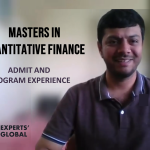Verbatim
Experts’ Global: Hi Swetnisha, thank you for your time today! Could you share your journey with our readers?
Swetnisha: Sure! My name is Swetnisha Shrivastava, and I am currently working as a Senior Consultant at Gap Inc. With a 13 year career in the tech industry, I had been planning to do an MBA for a long time. I kept postponing the leap until my daughter’s second birthday, after which I knew I had to pursue my business education or risk having my career growth completely subsumed by family life. I wanted to do an MBA, not just for the academic experience, but also to cultivate an understanding of strategy and ready myself for a leadership role.
My next step was to take the GMAT and begin researching good schools to apply to. A lot of my peers advised me to look into executive MBAs to match my years of work experience. Taking the help of MBA admissions consultants Experts’ Global, I was able to apply to a good list of reputed schools, and I received interview calls from seven business schools.
Unfortunately, COVID-19 came into the picture while I was giving my MBA interviews; nonetheless, I ended up picking the Leavey School of Business for my MBA. Over the 20-month length of the program, I got to build relationships with a truly amazing assortment of peers and professors and learned to handle change well due to our studies being conducted both online and in-person at different times as the pandemic situation evolved.
Experts’ Global: In your opinion, what actions of yours enabled your success?
Swetnisha: Every MBA aspirant has to introspect and uncover their own personal motivation for the degree. People might want to change functions, enter more challenging profiles, build an academic career, or develop a holistic understanding of business. You need to know what your specific MBA motivation is. Following my self-reflection and realization of my own desire for an MBA, I proceeded to work on my GMAT prep. After taking a free GMAT practice test, I began targeting a score within the 700-750 range and I decided on a three-month study schedule to keep my preparation focused.
Experts’ Global: With the benefit of hindsight, what mistakes did you make in the process?
Swetnisha: When I began my MBA journey, I missed out on applying to two schools as I could not get my applications ready before the deadlines arrived. I began researching my schools a month and a half after beginning my GMAT prep, which was a mistake in hindsight. I would advise others to begin their school research and GMAT prep simultaneously, as working on the actual applications can be more time-consuming than one expects.
The introduction about your strengths, weaknesses, leadership experiences, and triumphs can also take a while, and even beyond the GMAT score, business schools look at the totality of your profile. Therefore, demarcating enough time to come up with information to present a convincing profile is necessary.
Experts’ Global: During your GMAT prep, what was the biggest challenge you faced and how did you overcome it?
Swetnisha: Sentence Correction was a big challenge for me. However, just a month before I took the actual GMAT, I made sure to revise all the Marathon prep resources on the section. I also did a lot of practice question sets for Sentence Correction to build confidence. I ended up doing much better on the actual GMAT Sentence Correction questions than I did in practice or on the GMAT mocks. My takeaway was that instead of referring to multiple prep resources, pick one set to stick to and then focus on improving your weaknesses.
Experts’ Global: How was your business school application experience and what things did you do right to secure your admit?
Swetnisha: I believe that reaching out to Experts’ Global for help was an excellent decision on my part. The advice and resources I got from the firm helped me dive deep into my professional history and come up with a compelling story for my applications. Further, I attended several demo classes at business schools in my area to get a sense of the academic pitch of an MBA, and to prepare myself mentally for the same.
Experts’ Global: With what area of the application did you struggle the most and how did you overcome the difficulty therein?
Swetnisha: I struggled with crafting an impactful resume early on. Also, my MBA interview prep was challenging for me. Every business school has its own particular kind of interview, and the questions across each vary quite a bit. It took me some time to understand what kind of answers would reflect sincerity but also push forward my USPs without making it seem that I was selling my profile too hard. The fact that my interviews were held remotely due to the pandemic did not help either, as they seemed a bit impersonal.
Nonetheless, the mock interviews that I took with Experts’ Global helped me acclimatize to the MBA interview environment. The actual interviews themselves were surprising, as all of the panelists I encountered tried to make our conversations more relaxed. The questions I was asked were directed at finding out my motivations for the MBA, my fit for the business school community, and my ambitions for giving back to society after my degree was done.
Experts’ Global: What would you like to say about your lessons from managing the MBA application timeline?
Swetnisha: For the vast majority of the schools I was targeting, I had ample time to work on my applications, and with Experts’ Global’s help, I was able to streamline the process considerably and comfortably meet the deadlines for all of my selected programs. I learned overall that having an orderly plan in place can really eliminate delays in the application work.
Experts’ Global: What was your MBA experience like?
Swetnisha: My MBA experience was wonderful! At different times in the program, our classes were held either in-person or online depending on the pandemic’s impact. The academic load in the MBA was considerable, and tackling multiple case studies daily meant that I took at least two months to settle into a rhythm.
After that, I was able to better appreciate the different things that my peers and our faculty brought to the table. In my case, I excelled at strategy and macroeconomics, but was able to learn much from my community about finance. I was spending at least 15 to 20 hours weekly on my course work, and was able to experience a sense of team-building and collaboration that inspires me even today!
Experts’ Global: What is your final advice to the MBA aspirants reading this?
Swetnisha: As I mentioned before, be sure about your motivation for an MBA, because just completing the degree is not enough, and you will have a responsibility to give back to your community after your program experience. The MBA is not just for your professional growth, but also for your personal evolution. All the business leaders who have benefited most from an MBA have shown their willingness to impact their community positively. You also need to help out other alumni from your school and guide future MBA students from your alma mater when the need arises.
Further, make sure to enjoy the MBA journey while it lasts, and after you re-enter the professional domain, you need to collaborate with your seniors to figure out how you can most benefit your employer and get the greatest ROI for your degree in return. As an aside, regarding your GMAT prep, a good GMAT online course can do wonders for you by allowing you to study with greater flexibility.
Experts’ Global: Thank you for all the insights you have shared with us today, Swetnisha!
Swetnisha: My pleasure to help where I can!







